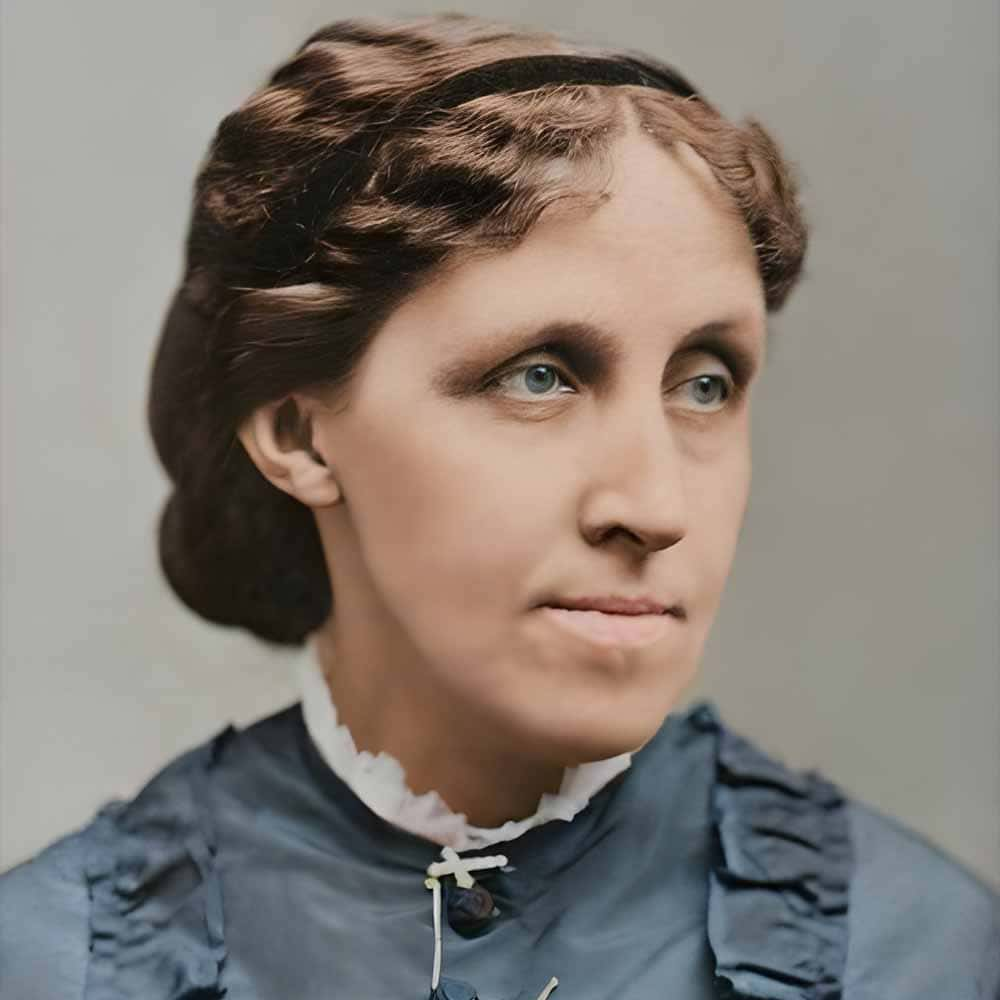
Louisa May Alcott: Celebrated Author and Feminist Icon
Born: 29 November 1832
Died: 6 March 1888
Country: United States of America
Notable works: Little Women, Good Wives, Little Men, Jo’s Boys, An Old-Fashioned Girl, Eight Cousins, Rose in Bloom, Under the Lilacs, Hospital Sketches
Louisa May Alcott stands among the icons of American literature, having carved a distinct place for herself with her works that continue to resonate with readers today. Born on November 29, 1832, Alcott spent much of her life in Concord, Massachusetts. In this environment steeped in intellectual stimulation and reformist ideology, Alcott’s writing prowess developed. Her growth as an author was deeply influenced by her family’s central role in the transcendentalist movement, exposing her to the leading thinkers of the day, such as Ralph Waldo Emerson, Henry David Thoreau, and Margaret Fuller. This rich intellectual and philosophical background, combined with the societal norms that often impeded women of her era, shaped Alcott’s unique voice.
Alcott’s most famous work, “Little Women,” encapsulated the intricate dynamics of family life and the aspirations of women striving for personal and artistic fulfillment. Through her writing, Alcott challenged the period’s gender conventions and promoted the notion that women could be ambitious and intellectual. She authored numerous novels and short stories, embracing a work ethic that propelled her to the forefront of American authors.
In addition to her literary achievements, Alcott’s life story is one of dedication and perseverance. Despite facing financial hardships and familial responsibilities, she persisted in her craft, supporting her family through her publications. Her legacy endures, not only through her written work but also as a symbol of the enduring spirit of American authorship and the impact that thoughtful, deliberate prose can have on shaping societal perspectives.
1. Early Life and Family
Louisa May Alcott was born on November 29, 1832, and her upbringing was intimately connected to the intellectual currents of her time, most notably the Transcendentalist movement. Her family’s relocation to Concord, Massachusetts, from Germantown, Pennsylvania, marked a significant period in her life, embedding her within a community that would deeply influence her development as a writer and an educator.
1.1. Childhood in Concord
After moving from Germantown, Pennsylvania, Louisa May Alcott’s family settled in Concord, Massachusetts, a place that became central to her life and literary career. Concord, with its vibrant intellectual and reformist environment, offered Alcott a rich tapestry of social and educational ideologies to absorb, far beyond the geographical move itself.
1.2. Influence of Transcendentalist Movement
The heart of the Transcendentalist movement, Concord, was where Alcott’s family formed close bonds with key figures like Ralph Waldo Emerson and Henry David Thoreau. These relationships profoundly impacted Alcott’s childhood, infusing her with the movement’s ideals of self-reliance and the innate goodness of people.
1.3. Bronson and Abigail May Alcott
Her father, Bronson Alcott, an educator, and Transcendentalist philosopher, alongside her mother, Abigail, who was actively engaged in reform and charitable efforts, significantly shaped Alcott’s beliefs and writings. Their progressive views on education and social justice were foundational to Alcott’s development.
1.4. Education and Early Work
Despite the family’s financial struggles, Louisa May Alcott received a rich and unconventional education, heavily influenced by her father’s progressive educational practices and the intellectual milieu of Concord. Tutored indirectly through the access to the thoughts and libraries of Emerson and Thoreau, and directly by her father’s circle, she was afforded a unique learning experience that far exceeded traditional schooling. From a young age, Alcott undertook various jobs such as teaching, sewing, and serving as a governess, experiences that not only contributed to her family’s income but also enriched her early literary pursuits.
2. Literary Career
Louisa May Alcott’s literary career was marked by her early forays into writing under pseudonyms, the immense success of Little Women, and her continued contribution to children’s fiction and American literature, showcasing a breadth of talent that spanned various genres.
2.1. First Publications and Pseudonyms
Alcott’s professional writing journey began with pieces sold to various periodicals under the pseudonym A.M. Barnard. These early works, passionate and fiery gothic thrillers, illustrated her versatility and willingness to explore different literary forms, significantly contrasting with the domestic narratives that later defined her legacy. Her first book, Flower Fables, published in 1854, was a collection of tales initially penned for Ellen Emerson, daughter of Ralph Waldo Emerson, showcasing her early storytelling prowess.
2.2. Breakthrough with Little Women
The 1868 publication of Little Women was a pivotal moment in Alcott’s career. Commissioned by publisher Thomas Niles to write a book for girls, Alcott drew upon her own experiences to create a semi-autobiographical novel that resonated deeply with readers. The portrayal of the March sisters – Jo, Meg, Amy, and Beth – offered a new narrative on the agency, intellect, and moral strength of women and girls, establishing Alcott’s reputation and contributing to changing cultural perceptions of women’s roles both within and beyond the domestic sphere.
2.3. Later Novels and Children’s Fiction
Following the success of Little Women, Alcott expanded her literary repertoire with sequels such as Little Men and Jo’s Boys, further solidifying her status in children’s fiction. However, her body of work was diverse, encompassing adult novels, short stories, and non-fiction, all woven with themes of social justice. This variety underscores Alcott’s engagement with the broader social, political, and personal issues of her era, challenging societal norms and exploring the complexities of character and societal constraints beyond her famed children’s narratives.
2.4. Themes and Literary Style
Louisa May Alcott’s writing, characterized by clear and engaging prose, frequently delved into themes of familial relationships, personal identity, and the societal roles of women. While her literary style reflects the transcendentalist influence of Thoreau, Emerson, and Hawthorne, it also evolved in response to her life experiences and the changing American cultural landscape. Alcott excelled in creating relatable, morally guided characters, her narratives rich with the complexities of individual character and societal expectations, ensuring her work’s enduring relevance and appeal.
3. Activism and Reform
Louisa May Alcott’s legacy extends well beyond her literary achievements, encompassing her fervent commitment to abolitionism, women’s suffrage, and educational reform. Her life and works reflect a deep dedication to these causes, influenced by her family’s passion for reform and her convictions.
3.1. Abolitionist and Women’s Suffrage Movement
A staunch abolitionist, Alcott actively participated in abolitionist activities, driven by a strong belief in the necessity of ending slavery in the United States. She was equally committed to the cause of women’s suffrage, advocating for the right to vote as essential for achieving true equality. While her writings often mirrored these beliefs, it is important to note that characters such as Jo March from Little Women more directly represent Alcott’s progressive ideals, particularly in terms of gender norms and women’s independence, rather than Amy March, who is often remembered for her artistic ambition and personal growth.
3.2. Civil War Contributions
Alcott’s service as a nurse during the Civil War profoundly impacted her, an experience she vividly recounted in Hospital Sketches. This collection of stories offers a personal and detailed account of the conditions during the war and highlights the significant roles women played in the effort. While Aunt Jo’s Scrap Bag includes a variety of tales that reflect Alcott’s broad social and moral concerns, it is Hospital Sketches that more directly conveys her wartime experiences and contributions.
3.3. Educational Reforms
Louisa May Alcott’s advocacy for educational reform was intricately tied to her feminist beliefs, aiming to provide more liberal and progressive educational opportunities, particularly for women. Though not an educator in the formal sense, Alcott’s promotion of educational ideals was deeply embedded in her works. Through her emphasis on self-education, moral development, and intellectual curiosity, Alcott championed the empowerment of women, advocating for their right to stand equally in society alongside men. Her literary contributions, therefore, served as a powerful vehicle for expressing her vision of a more equitable and enlightened educational landscape.
4. Louisa May Alcott Personal Life and Challenges
Louisa May Alcott’s life was intricately woven with a series of health issues and personal struggles that significantly influenced her work and relationships. Her journey, characterized by her family’s financial instability and her bouts with illness, profoundly impacted her writing and legacy.
4.1. Health Struggles and Typhoid
In 1862, amidst the turmoil of the Civil War, Alcott served as a nurse in the Union Hospital in Georgetown. It was there she contracted typhoid fever, a common and deadly disease of the time. Her survival came at a cost; the treatment she received, which included mercury poisoning through the administration of calomel, left her with lasting health complications. These health struggles would haunt her for the remainder of her life, influencing both her physical well-being and the themes she explored in her literature.
4.2. Relationships and Influence
The complexity of Louisa’s relationships, especially with her father, Amos Bronson Alcott, was a defining aspect of her life. As a transcendentalist philosopher and educator, her father instilled in her a foundation of progressive views. Yet, the loving bond they shared was tested by the financial instability that shadowed their family’s life. This tension between idealism and practicality is mirrored in Alcott’s writings, particularly in the nuanced depiction of familial dynamics in Little Women and its continuation, commonly referred to as Good Wives. Through these narratives, Alcott delves into the struggles and resilience of families facing adversity, drawing from her lived experiences.
4.3. Death and Legacy
On March 6, 1888, Louisa May Alcott died of a stroke at the age of 55. She was buried at Sleepy Hollow Cemetery in Concord. Her work continued to reflect her life’s struggles and was posthumously published in the Atlantic Monthly. Alcott’s legacy endures, with her writings remaining a reflection of her triumphs and challenges.
5. Cultural Impact and Recognition
Louisa May Alcott’s legacy extends far beyond her literary accomplishments, leaving a lasting influence on various aspects of culture and education. Her work, particularly Little Women, has not only left an indelible mark on literature for young women but has also been shaped by the ideals of the Transcendentalist movement, thanks to her family’s deep involvement.
5.1. Adaptations of Alcott’s Works
Louisa May Alcott’s novels, especially Little Women, have reached a wider audience through numerous film, television, and theatrical adaptations. The 2019 film adaptation directed by Greta Gerwig, for instance, received critical acclaim and introduced Alcott’s enduring themes to a new generation. Other notable adaptations include:
- Film & TV: Little Women has seen various adaptations, such as the 1994 film and a BBC miniseries in 2017, showcasing the timeless appeal of Alcott’s characters and narratives.
- Theatre: Stage adaptations have also played a pivotal role in keeping Alcott’s work alive, often with Jo’s character capturing the audience’s imagination with her spirit and determination.
5.2. Scholarship and Biographies
The academic world has thoroughly explored Alcott’s life and contributions, with a wealth of biographies and studies examining her literary output and personal journey. Key scholarly works include:
- Academic Texts: Investigations into Alcott’s lesser-known works, like A Modern Mephistopheles and Jo’s Boys, enrich our understanding of her literary range.
- Biographies: Detailed studies of Alcott’s life, especially her relationships with her sisters – Anna, May, and Elizabeth – and her experiences within the rich cultural backdrop of the Transcendentalist movement.
5.3. Orchard House and National Women’s History Museum
Louisa May Alcott’s former home, Orchard House, serves as a historic site devoted to preserving the author’s legacy and highlighting the Alcott family’s contributions to social reform. Meanwhile, the National Women’s History Museum, with its extensive online presence and plans for a physical museum, celebrates Alcott’s role in American literature and women’s history. Key highlights include:
- Orchard House: An inspiration to thousands yearly, this site offers visitors a glimpse into the environment that inspired much of Alcott’s work.
- National Women’s History Museum: Alcott is featured among the many women who have played pivotal roles in shaping American history and advancing women’s rights, reflecting her significant cultural and educational impact.




